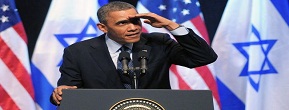Real diplomacy with Iran is Obama's only choice, US analysts say
 US President Barack Obama must treat Iran interests seriously by accepting it as an unavoidably important regional player if he wants a diplomatic solution to Iran's nuclear issue, American analysts say.
US President Barack Obama must treat Iran interests seriously by accepting it as an unavoidably important regional player if he wants a diplomatic solution to Iran's nuclear issue, American analysts say.
In an article published on Aljazeera website on Friday, Hillary Mann Leverett and Flynt Leverett, co-authors of the book Going to Tehran: Why the United States Must Come to Terms with the Islamic Republic of Iran, called on the Obama administration to accept Iran “as an enduring political entity representing legitimate national interests.”
The analysts said there could be no diplomatic solution to Iran's nuclear dispute “if the administration does not change course and accept Iran's strategic independence and rising regional influence - including accepting the principle and reality of internationally-safeguarded uranium enrichment in Iran....”
Based on their own observations in Iran, the authors argue that despite claims by some experts, Washington sanctions against Tehran have failed and that Iran has not been “softened up.”
The authors assert that sanctions have become an unconstructive diplomatic tool in negotiations with Tehran as “Obama's ability to modify sanctions in the course of negotiations - or lift them as part of a deal - is tightly circumscribed by laws that he himself signed.”
“Tehran's conditions for a long-term deal remain fundamentally what they have been for years - above all, US acceptance of Iran's revolution and its independence, including its right to enrich under international safeguards,” the authors add.
The analysts say as “the US reaches the end of its ability to threaten ever more severe sanctions against countries doing business with Iran,” Tehran continues developing its “indigenous” peaceful nuclear capabilities under International Atomic Energy Agency (IAEA) monitoring.
“Under these circumstances...he [Obama] could launch another war to disarm yet another Middle Eastern state of weapons of mass destruction it does not have - not to remove a chimerical "existential threat" to Israel, but to protect Israel's military dominance over its own neighborhood they add.
The United States, Israel and some of their allies have repeatedly accused Iran of pursuing non-civilian objectives in its nuclear energy program.
Iran argues that as a committed signatory to the Non-Proliferation Treaty and an IAEA member, it is entitled to acquire and develop nuclear technology for peaceful purposes.
In addition, the IAEA has conducted numerous inspections of Iran's nuclear facilities but has never found any evidence showing that the Iranian nuclear program has been diverted toward military objectives.
Add new comment